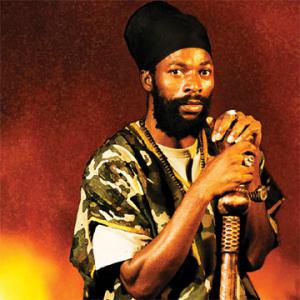Capleton, you were born in the parish of Saint Mary (With a population of 115000, Saint Mary is one of Jamaica's smallest parishes, located in the county of Middlesex in the northeast section of Jamaica. Its chief town and capital is Port Maria, located on the coast, red.), an area that's still very dear to you, I believe?
Capleton: "St. Mary is a very historical place as it was there that the first Jamaican slave rebellion took place (Tacky's War, or Tacky's Rebellion, was an uprising of black African slaves that occurred in Jamaica in May, June and July 1760. On Easter Sunday, Tacky and a small group of slaves from neighboring plantations murdered their masters and marched to Port Maria where they killed the guards at Fort Haldane and stole several barrels of gunpowder and firearms. They fought alongside hundreds of other slaves and Maroons for five months but their rebellion was ultimately quashed by the far more powerful British and the death of Tacky in a fierce gun battle, red.) back in 1760 and it was also the first place where the Spaniards settled when they discovered Jamaica (Puerto Santa Maria, now Port Maria, was the second town the Spaniards built on the island, red.)."
For many years now you've been organizing the A St. Mary Mi Come From festival there. As that festival is a benefit, what exactly are the proceeds used for?
Capleton: "It started out as a local St. Mary thing, but over time we've branched out and now we're all over Jamaica aiding wherever we're needed. Most of our proceeds go to local schools, hospitals, youth centers and what have you. Just recently we furnished a computer lab in a school and bought an x-ray machine for a local hospital. For the first time in years, this year the festival won't take place as we want to bring it back to its original location at Clemhard's Park in the heart of Port Maria."
Is that something you feel you have to do as a Rastafarian?
Capleton: "I think it's something anyone who's a bit of a role model can and should do. It's up to people like us to set an example and leave our footprint in the sands of time (phrase from a poem by Henry Wadsworth Longfellow, describing the mark that great individuals leave on history, red.)!"
You're a shining light for the Boboshanti movement. Why do you think Jah guided you toward Boboshanti, rather than to any of the other branches of Rastafarianism?
Capleton: "Well, first of all I would like to state that for I&I there's no separation in Rastafari because in my father's house there are many mansions (John 14:2, In my Father's house are many mansions: if it were not so, I would have told you, red.). Rastafarianism is not a religion, it's a livity and in the end all Rastafarians talk about reparation, liberation, repatriation and salvation. The Boboshanti movement represents the priestly part of Rastafarianism. I chose to embrace them because their way of life and their way of reasoning felt natural to me, but as I just said, it's all one love, one heart and one meditation!"
Where the ital way of living is concerned, you're taking things a step further abiding by what is known as the Nazarite vow (Numbers 6, red.).
Capleton: "The food you put into your body is one of the most important things in life, so I chose to live a vegan lifestyle, meaning I don't eat fish or meat, don't drink alcohol, nor do I use dairy products like cheese, milk or butter; it's strictly vegetables for me! The Nazarene vow further tells me not to use anything that comes from a vine. The healthier your lifestyle the longer you can preserve yourself on this earth, so I try to live natural. If you listen to your temple (Capleton is referring to the human body here, red.), it will tell you what you need and what is good for you."
Is it hard to maintain that lifestyle when you're on the road?
Capleton: "No, because I always travel with my own chef! (laughs) He's a blood relative of mine, so he knows what I want and need."
On 'I-ternal Fire', your last album to date, we got to hear a lot more of the singing voice of Capleton.
Capleton: "I really wanted ‘I-ternal Fire' to be a one-drop album. I never did a complete one-drop album before, as my previous albums were all a bit of mix of styles. I worked with a lot of top musicians and was very pleased with how it turned out. It's still getting airplay today, so that's proof that my fans also liked it."
'I-ternal Fire' already dates from 2010 and on your tours you keep playing for sold out theaters. Do you feel turning out albums is still a necessity?
Capleton: "Oh yes, absolutely! That being said, I'm not a fan of turning out album after album; you have to give people the time to get to know and appreciate an album."
You've been twenty years in the music business now. If you had the opportunity to travel back in time and talk to the young clean-shaven version of yourself, what would you tell him?
Capleton: "(laughs) I would tell him to persevere and stay focused, tell him to stay positive and hail Rastafari, which is the true way of life as Jah has guided me in word, power and sound. I'd tell him so many things, but maybe above all to stay humble, tolerant and diligent. Let no one tell you you can't make it in life; don't worry about stumbling blocks you might find on your path, because that is all part of the struggle of life, there to let you know you have to be courageous and battle on. Just go for it!"


